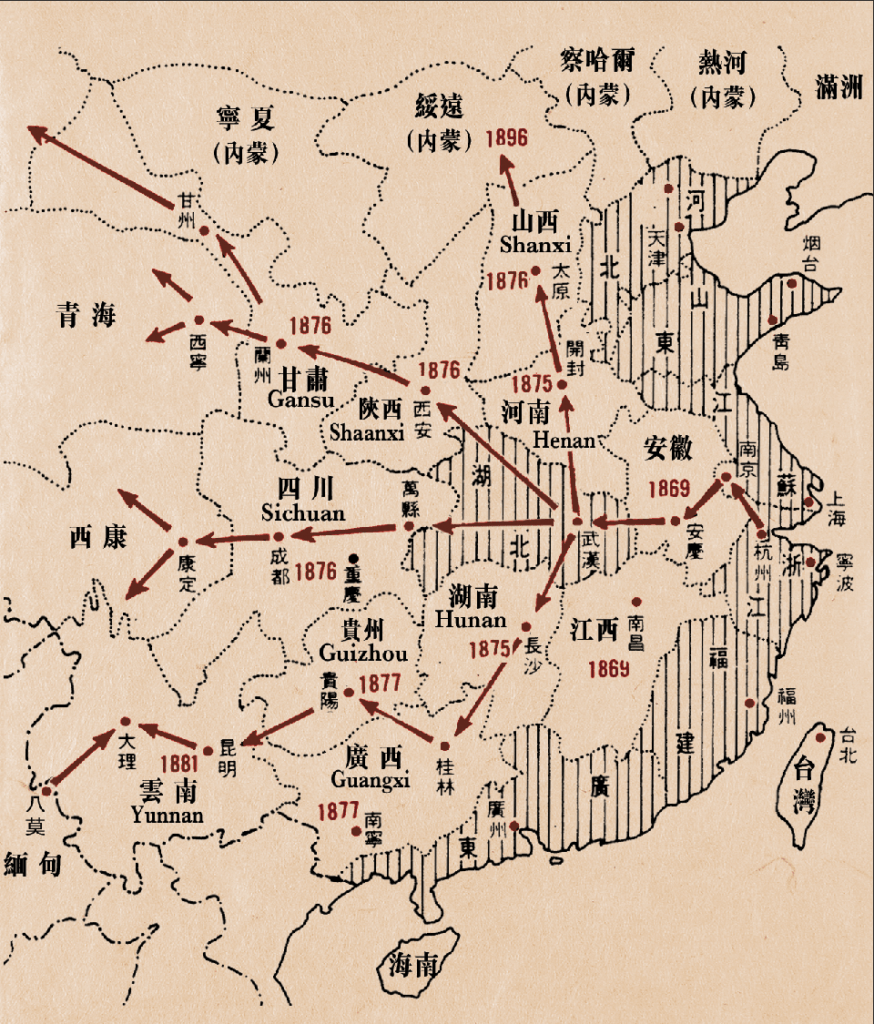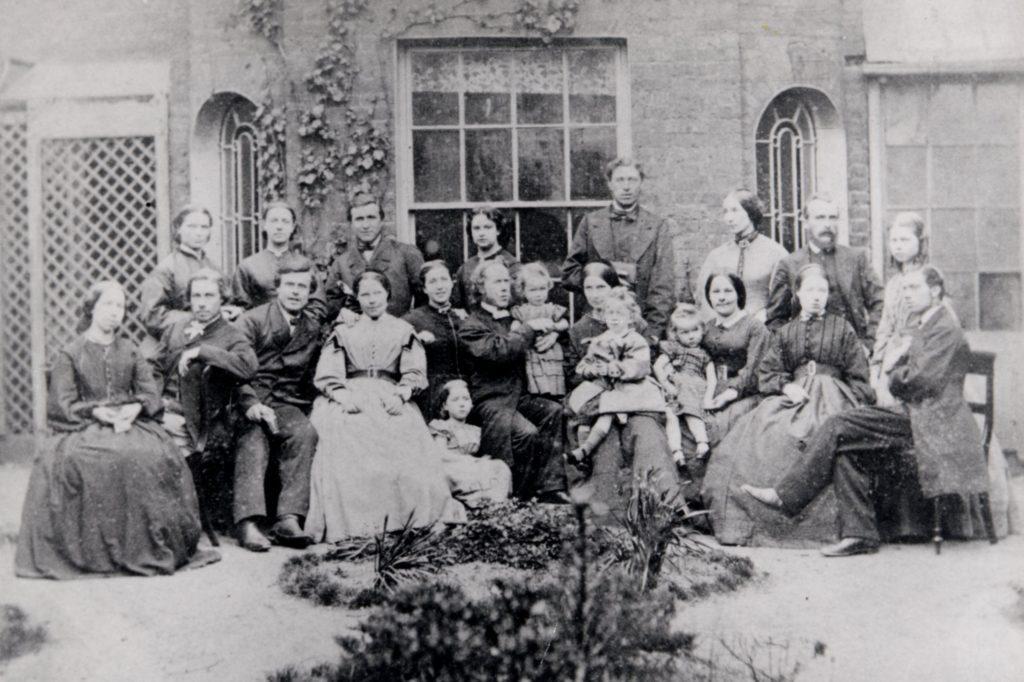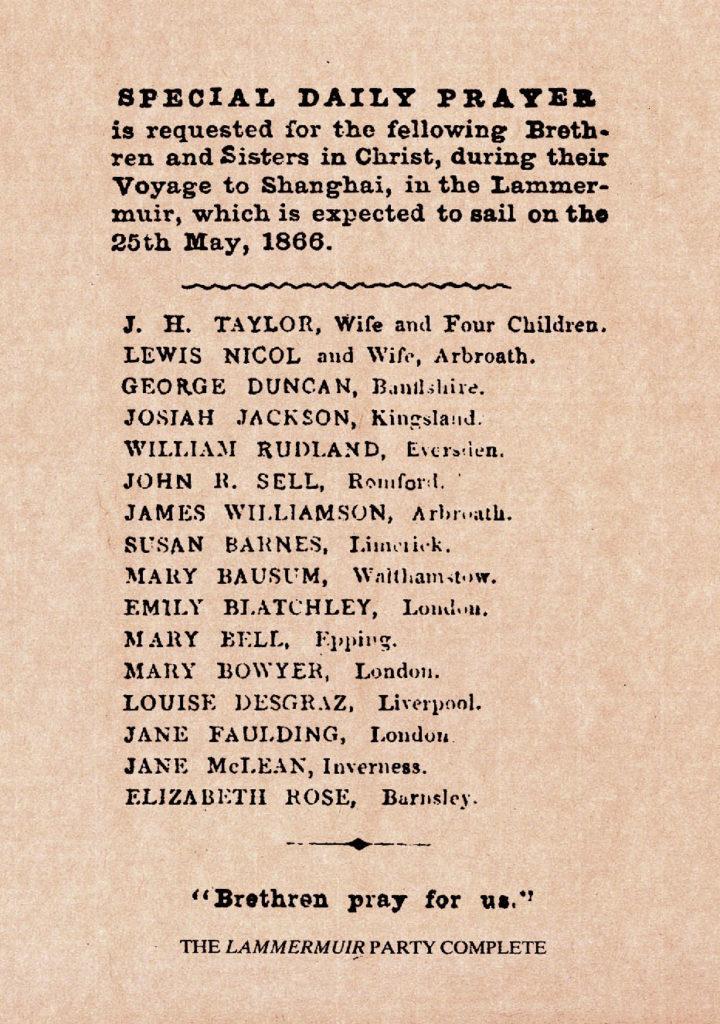


BREAKTHROUGH, LEGACY, RESPONSE: REFOCUSING ON HUDSON TAYLOR
突破 , 傳承 , 回饋 -- 顧往瞻來聚焦戴德生
What Would Hudson Taylor Do Today?
BY REV. Dr. Patrick Fung
General Director of OMF International
A Passion for Lost Souls
As Hudson Taylor first arrived in Shanghai, only 21 years-old, he was greatly struck by how the inlands of China had been neglected by the church. At the time, there were already several churches in China, but they were all found only within Shanghai and the four other treaty ports. As Taylor came to understand this reality, he developed a burning passion to bring the gospel past the walls of the port cities, to reach the whole people of China. He was convicted that the gospel was for everyone, to leave so many unreached was unacceptable in the sight of God. He possessed a powerful passion for lost souls.
In 1860, Hudson Taylor was taken ill, and bedridden, forced to return to Britain. In the following years, God led him to write and publish a book, China’s Spiritual Needs and Claims. The book sought to appeal to the British public, and move them to urgently bring the gospel to the whole of China. Taylor believed that simply acknowledging the need in China was not enough. Action was necessary. In China’s Spiritual Needs and Claims, he wrote,
Beloved brothers and sisters, we cannot but believe that the contemplation of the solemn facts we have laid before you has awakened in each one the heart felt prayer – Lord, what wilt Thou have me to do, that Thy name may be hallowed, Thy kingdom come, and Thy will be done in China?
Hudson Taylor refused to accept the status quo, to ignore the spiritual needs of the inlands, as had been done for years. It is that refusal, that dissatisfaction with how the church had handled missions, that enabled the CIM to grow at an impossible rate, and spread the gospel throughout the inlands in only a short 25 years.
Thus, we should ask ourselves carefully where the gospel frontiers are today. Who are the lost souls that have been neglected, marginalised, and forgotten? What are the status quos that we have taken for granted, and failed to challenge or change, even when they obstruct the furtherance of God’s kingdom? These may no longer be geographical frontiers, as they were in Hudson Taylor’s time. But in every society, there continues to be lost souls in desperate need of the gospel.

The 9 unevangelized provinces
A Prayerful Dependence on God and His Faithfulness
As Hudson Taylor prepared for missions, he spent his Sundays doing gospel work in the poor parts of Drainside. One week, he was approached by a poor man who asked Taylor to come and pray for his wife, whom he feared would not survive the night. Taylor agreed. As they went, he explained that his family was starving, and that they had no money whatsoever. At that moment, all Taylor possessed financially was a single half-crown coin. Without it, he would have no means to buy dinner the next day. As he followed the poor man, he thought to himself, if only he had smaller change, then he would have gladly given this man most of the money. But no matter how he wrestled with it, he was not prepared to give up all his money to bless this poor man. Arriving at the man’s home, he began to pray. But the moment he said, “Our Father, who art in heaven,” he was struck by a profound sense of distress and guilt, as he was convicted by God of his hypocrisy: speaking of trust in a loving and generous Father, when he himself was not willing to trust God with this money. Hearing God’s clear instruction, Hudson finally decided to give the poor man the half crown, all he had.
That was the moment he discovered the significance of a prayerful dependence on God’s faithfulness. Writing in his diaries, Taylor recalled that as he returned home that day, “[his] heart was as light as [his] pocket”. He committed the money to God, and trusted that the Lord would repay his investment in due time. But he never expected that the next morning, he would receive, in an envelope from an unknown sender, a half-sovereign, four times the value of the half-crown he had given the night before. Taylor later wrote, “What we need is not a great faith, but faith in a great God… Depend upon it, God’s work done in God’s way, will never lack God’s supplies”.
But Taylor’s dependence on God was not limited only to financial, or material needs. The most remarkable thing about the CIM was its staggering rate of growth, with a constantly growing inflow of new workers. Today, we would think about mobilization techniques and efforts: marketing, communication, outreach. These are not bad or problematic practices. But the CIM’s expansion didn’t rely on them. Instead, it was entirely founded upon consistent, dedicated prayer. In 1875, Taylor prayed for eighteen workers, and God delivered. In 1882, he prayed for seventy workers, and God delivered. In 1886, a hundred workers, delivered. The most remarkable account, however, was under D.E. Hoste, Taylor’s successor as leader of the CIM. In 1929, in the midst of the anti-Christian movement, the CIM issued a call for prayer, to pray for two hundred new workers. At a time when Christians in China were being persecuted and slaughtered by the hundreds, the CIM not only refused to retreat from China, but prayed for more growth. And God delivered, sending 203 new workers in less than three years. Hoste lived out what he had learned from Hudson Taylor: to move man through God, by prayer alone.
Today, are we prayerfully dependent on God’s faithfulness? Are we willing to trust Him to provide, or are we holding ourselves back because we do not trust Him to make the future supplies available? This is not a call for reckless and irresponsible action, taking any and all action without thought. But prayer must be the backbone of our trust and our dependence on God. We should seek to hear where He is leading us, and to obediently follow wherever He may lead. What is God impressing upon us to pray for, both for ourselves and His global mission?
Innovation in Mission Practices
Hudson Taylor is well known for his adoption of Chinese culture. From the founding of the CIM, it has been one of their key policies. As Taylor wrote:
In all things unrelated to sin, let us seek to identify with the Chinese so that they may be won to the Lord. Let us wear their clothes; learn their language; follow their example. Health permitting, let us eat their food. Let our houses be like theirs… let the interior differ only as health determines…
At the time, for British people to live this way was unheard of. But Hudson Taylor was rarely limited by the norms and cultures of the day. He believed in the need for innovative mission practices; that we should do whatever possible to best serve God’s kingdom, even if they had never been done before. Thus, to reach the hearts of the Chinese people, he put down his own culture and lifestyle and adopted theirs.
Before 1875, there were no single women in Chinese missions. Not until Hudson Taylor sent some to Shanxi, to help with the famine. Valerie Griffiths wrote that Taylor’s decision—to send single women with equal status as single men—was the most radical of all his policies, scandalising Victorian Britain. But Taylor sought to reach the whole people of China, including women. Thus, to reach the hearts of the Chinese women, he sent women to serve them.
In 1866, Taylor arrived in China with the Lammermuir Party, named after the ship they travelled on. Most of the party were not educated. There were blacksmiths, carpenters, stonemasons—common people. They were not the type of people that were typically sent for missions. But Taylor had prayed for God to bring willing, skilful labourers to China, repeating the language used in 1 Chronicles 28:21. Thus, when God brought forward these common workers, Taylor knew that God would use them, and did not allow cultural norms to stop them.
Today, what are the norms and practices, both cultural and missional, that we have taken for granted? Are we doing everything possible for the furtherance of God’s kingdom, and exploring new, unconventional mission practices to serve the needs of the people? This is not to say that we should be different only for the sake of uniqueness. But just as Taylor did in his time, we must not be afraid to re-examine and question our old ways, and to innovate upon them as God and the situation leads us to do.


The Lammermuir Party
Partnership in the Great Commission
And Jesus came and said to them, “All authority in heaven and on earth has been given to me. Go therefore and make disciples of all nations, baptizing them in the name of the Father and of the Son and of the Holy Spirit, teaching them to observe all that I have commanded you. And behold, I am with you always, to the end of the age.”
- Matthew 28:18-20 (ESV)
The Great Commission is a calling for every single follower of Christ. It began with the apostles, but has passed down to every generation of believers, including future ones. Nowhere does the great commission place restrictions on who is or is not included in this command. Thus, Hudson Taylor believed that we must have partnership in the Great Commission. The CIM did not work alone, only British missionaries preaching to the Chinese people. Rather, they worked and served closely together in partnership with the Chinese. Wang Lai Quan was one of Taylor’s closest colleagues and friends, working together to translate the Bible for the Chinese. When Grace, Hudon’s daughter, passed away, Wang dug her grave himself, and the two buried her together. There is no greater evidence of the close relationship they shared.
Today, what is our attitude towards collaboration and teamwork in missions, especially with those from groups different than our own? Do we perceive missions as being unidirectional, only from one part of the world to another? Do we allow differences in church histories and traditions to divide our efforts? Let us pray that God would reveal to us the missed opportunities, the artificial and meaningless divisions that we have drawn between ourselves, and help us to dismantle them for the furtherance of His kingdom.
The Pre-eminence of Christ
It is obvious that Hudson Taylor had a great passion for China, and the development of the Chinese Church. Famously, he said, “If I had a thousand pounds, China should have it. If I had a thousand lives, China should have them.” But it is a mistake to think that China was the centre of Taylor’s life, or his greatest priority. Because that quote is incomplete. He continues, “No, not China, but Christ. Can we do too much for Him?” Hudson Taylor was convicted of the pre-eminence of Christ.
Taylor and the CIM faced countless challenges throughout their ministry. The Yangzhou Incident in 1868 nearly killed Taylor’s pregnant wife, Maria. This left him in a deep spiritual depression for about a year. But what brought him relief was a letter from a colleague, John McCarthy, which read, “The Lord Jesus received is holiness begun; the Lord Jesus cherished is holiness advancing; the Lord Jesus counted on as never absent would be holiness complete.” Following the Boxer Incident, when many of the CIM’s workers were murdered, Taylor wrote, “I cannot read; I cannot think; I cannot even pray; but I can trust.” Over and over again, in the face of unthinkable adversity, Hudson Taylor hung on to a single universal truth: that Christ is Lord over all.
Ironically, it is very easy to lose sight of Christ in the pursuit of God’s kingdom. We easily seek to solve problems by our own means, and become dejected and hopeless in the face of failure. But as Taylor did, we must keep Christ as the first and central focal point in our lives, and allow everything else to follow from there. As Taylor said, “If God is not lord over all, He is not lord at all.”
A Man with a Nature Like Ours
It is tempting to be intimidated or overwhelmed by the stature of Hudson Taylor. In church history, he is thought of as a ‘spiritual giant’. What hopes have we of sharing in the convictions of such a man? But in James 5:17, it is written that “Elijah was a man with a nature like ours,” to remind us that the miracles he brought through prayer are not out of reach for any believer. Likewise, we too are reminded that Taylor is no greater a man than any of us, and that we can all share these convictions in our lives. As we reflect on the questions posed here today, let us pray as Taylor taught us: ‘Lord, what will you have me do, that Your name may be hallowed, Your kingdom come, and Your will be done?’